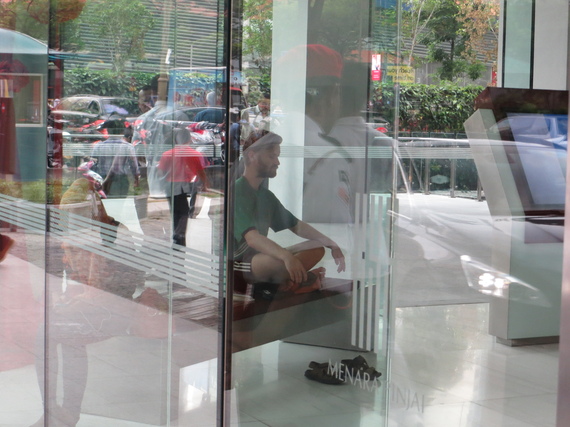In 2016, the annual meeting of the Academy of Management brought together close to 10,000 scholars on the theme, "Making Organizations Meaningful". Within the topic's broad scope, I chose to attend the Management, Spirituality, and Religion workshops and symposia, because of my current research into the role of mindfulness practices in business. I was interested in how such practices helped leaders experience the world as more deeply connected - to self, others, and Nature - and what it meant for sustainable business outcomes. My hypothesis was that regular mindfulness practices, whether meditation, walking in Nature, music, exercise, or other similar activity, helped cultivate broader perception and greater awareness of how one's attitudes and actions impacted others and the world. This, in turn, would transform the social identity of leaders, increasing their emotional and social intelligence, and consequently making them more likely to take decisions and pursue actions that positively impact society and future generations. For the moment it was only a hypothesis. Fortunately, I had Case Western Reserve University's resources and talented doctoral students in the Weatherhead School of Management to help me conduct multi-year field research on this topic. At AOM, I was interested to hear how other scholars were thinking about these issues.
What I learned was that the topic of spirituality and religion attracted a large number of management scholars for a wide variety of reasons. For some, the "soft stuff" of inner well-being was seen as critical to effective leadership. Deep listening, empathy, compassion, a calling - these were considered essential to career success, especially in turbulent times. A few minutes of silence before meetings or at other key moments during high pressure days could improve a person's performance and resilience at work. For others, care for a person's spirit, or soul, was seen as the next frontier in human flourishing. The anxieties of leadership can be difficult and daunting in the best of times. Practices that connect us to what is meaningful, to our life purpose (or calling), and to others and Nature, can help us to feel whole and at peace with ourselves. As one scholar said, wholeness is both complex and all encompassing, and simple, as a way of being in the moment. For another group, practices of connectedness, whether spiritual or secular, help us deal with pragmatic business realities. For example, companies whose vision and mission offered something greater than making money were more likely to attract and retain talented employees and loyal customers, especially in the case of Millennials and Generation Z. Such practices contribute to a greater sense of fulfillment for employees seeking meaning at work and for customers who want to align their values with the embodied values of a particular brand or product. In this view spirituality and religion contribute to greater organizational effectiveness in a marketplace that expects them to be manifest in the essential purpose and values of business. For still others, a spiritual connection to fellow human beings and the earth was needed to face the local and global challenges of the 21st century. Spiritual practices (though less often religious ones) can help people see humanity and all life in unitary terms. A holistic worldview was seen as more likely to produce caring and stewardship behaviors. To take one example, our choice to eat ethically depends in part on how we see other animals, whether they are trivialized as resources for consumption or considered to be sentient beings deserving our compassion. Another example was business as a force for peace. When business people experienced the work place from a "We" rather than "Me" perspective, they found it easier to bridge the socio-political boundaries that divide us.
There was some lightheartedness too. "What is the difference between prayer and meditation? In prayer, you're talking to God, in meditation you're listening." Or, quoting Groucho Marx, "Why should I care for future generations? What have they ever done for me?"
By the end of the AOM meeting, I came to a number of preliminary conclusions about the role of mindfulness practices in business. Experiencing our lives as deeply interconnected - mentally, emotionally, and spiritually - changes how we think and act. We become more empathetic and compassionate; we see ourselves as an integral part of the natural world rather than separate from it; and we become more coherent in ourselves and in our interactions with others. These changes are critically important at a time when the social value of business is being publicly questioned. A greater awareness of connectedness changes the very purpose of business. Such an awareness lies at the heart of business as a force for good, as leaders experience their lives and the lives of their organizations as relational rather than as bounded individual entities. The goal becomes to create prosperity for all, not just for the richest one percent; and to contribute to a healthy environment and improved human well-being. This is very different from the current goal of generating profit in a model of minimizing harm implicit in today's corporate sustainability efforts.
Last and perhaps most encouragingly, statistical evidence and numerous academic studies presented at the AOM sessions showed that businesses that take more care of people and the environment are also more profitable. We now know analytically that doing good can lead to doing well. We are only beginning to understand the emotional, relational, and spiritual foundations of flourishing enterprises.
This post is part of a series produced by The Huffington Post and LEAP!, the United Nations PRME Working Group on the Sustainability Mindset. The series aims to feature perspectives and insights from the 76th Annual Meeting of the Academy of Management Conference, Anaheim 2016. For more information about the Conference, visit www.aom.org.
Keywords: management, meaning, mindfulness, business, meditation, Emotional Intelligence, leadership, Generation Z, sustainability
